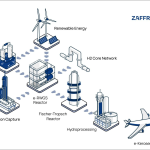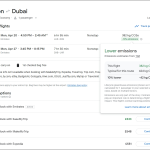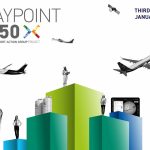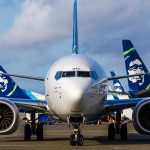Shell Aviation has announced three new sustainable aviation fuel airline agreements, two with US carriers JetBlue and Alaska Airlines for operations from Los Angeles International Airport (LAX), the other with Air Greenland for flights between the Danish capital, Copenhagen, and Greenland’s major airport, Søndre Strømfjord/Kangerlussuaq. In the JetBlue deal, Shell will supply 10 million gallons of blended SAF to the airline at LAX during the next two years, with an option for another 5 million gallons the following year at that airport or others. Alaska will also receive up to 10 million gallons of neat SAF, as well as working with Shell to increase supplies of the fuel on the US West Coast and help alleviate fuelling infrastructure limitations in the Pacific Northwest. The Air Greenland deal, effective this month, is its first acquisition of SAF and will comprise up to 5% of the blend used on the carrier’s Copenhagen-Kangerlussuaq flights, more than double the proposed initial EU mandate of 2% from 2025.
The new SAF agreements between Shell and the two US carriers build upon multiple existing agreements by the airlines with other suppliers and progress each of their ambitions to achieve net zero carbon emissions by 2040, a decade earlier than the airline industry’s generic 2050 target.
The JetBlue partnership with Shell Aviation builds on a SAF programme launched in 2020, when the airline began using supplies provided in Los Angeles and San Francisco by renewable fuel producers Neste and World Energy. The airline has also signed agreements for future SAF supplies from Aemetis, Fidelis New Energy and Air Company, with the latter planning to produce low-emission fuel from converted CO2 emissions.
“We’ve long said we need multiple key stakeholders to step up to reach our aggressive emissions reduction goals,” said JetBlue CEO Robin Hayes. “This deal with Shell is a key signal of the growing engagement of the major fuel producers to begin converting conventional jet fuel to SAF. Shell’s involvement, with their expertise in energy markets and logistics, is a validation of the SAF market’s potential and highlights how critical the SAF transition of our hard-to-decarbonise industry is to establishing a more sustainable future of flight.”
Sarah Bogdan, the airline’s Director of Sustainability and ESG, added: “We envision a future of a robust, regular and diversified supply of SAF delivered all around our network, incrementally replacing conventional fuels and driving down emissions in our operation. We’ve publicly committed to cutting our per-seat emissions in half by 2035 and a viable SAF market at scale is a key component to meet this goal. Working with Shell will not only help grow the availability of SAF in the long term but also ensure this transition is sustainable from a business perspective by building the connections and infrastructure to help keep the cost of SAF competitive with traditional fuel.”
The airline and the oil major will also collaborate to enable corporations to purchase JetBlue-issued SAF certificates to help compensate for the emissions from air travel by their employees. This will be enabled through the use of Avelia, a blockchain-powered SAF book-and-claim mechanism developed by Shell and Accenture with support from the Energy Web Foundation, and using the travel management services of American Express Global Business Travel to aggregate global business demand for SAF.
Once the new Shell deal takes full effect, SAF will account for 15% of JetBlue’s fuel uplift from LAX. The airline said this initiative and its other sustainability commitments would also apply to its planned integration – subject to regulatory approval – of low-cost carrier Spirit Airlines into its operation.
But while it highlighted increased SAF use in California, JetBlue said this was due to that state’s low-carbon fuel programme, adding that increased voluntary use of SAF at airports elsewhere would require additional state and federal level incentive programmes for SAF producers and airline purchasers.
In addition to buying neat SAF from Shell, Alaska Airlines has also agreed to work with the oil company to help develop the SAF market beyond a standard fuel supply arrangement. The new partnership includes commitments to broaden understanding of technology, infrastructure, carbon accounting systems and public policy support required to increase SAF production, lower the cost of the fuel and deliver it to more markets.
“We’ve pioneered SAF technologies for more than a decade. But we can’t scale the market alone,” said Diana Birkett Rakow, Alaska Airlines’ SVP Public Affairs and Sustainability. “We’re excited to take this next step in the journey with Shell, to leverage their deep knowledge of the energy industry, its infrastructure requirements and supply chain to make lower lifecycle carbon SAF more widely available for the future.”
As airlines increasingly commit to 10% SAF blends by 2030, Shell also wants 10% of its 2030 jet fuel sales to be SAF, and is building capacity to blend, handle and distribute the alternative fuels to help expedite decarbonisation of air transport. “SAF will be the key technology to help decarbonise flight,” said Jan Toschka, President of Shell Aviation. “LAX is a critical North American airport hub and we’re delighted to be able to provide JetBlue and corporations on its Sustainable Travel Partners programme access to SAF, allowing them to lower their emissions while jointly contributing to investments in SAF.”
Toschka also welcomed the broader partnership with Alaska Airlines to increase the SAF supply to the airline and to build capabilities for broader distribution. “We need support from the entire ecosystem to build a sustainable future for aviation,” he said. “This deep level of collaboration will help us put the technologies and supply chain in place to advance the industry.”
In Greenland, DCC & Shell Aviation Denmark, a joint venture between DCC Holding Denmark and Shell’s global aviation fuel division, has partnered with Air Greenland to provide SAF on flights between Copenhagen and Søndre Strømfjord/Kangerlussuaq, the largest airport in Greenland and one of the most important air corridors into the country. DCC & Shell Aviation is Denmark’s largest independent jet fuel supplier, providing logistics for and delivering Shell jet fuel to nine of the country’s airports.
Through the new agreement, Air Greenland has now introduced a SAF blend of up to 5% on the four-plus hour Copenhagen-Kangerlussuaq route, which is being upgraded from an Airbus A330-200 to a new, more fuel-efficient A330-800 neo jet. The deal is also the first to supply SAF to Copenhagen Airport.
“We want to support the goal of Greenland becoming a sustainable destination by reducing fuel consumption and thus our CO2 emissions,” said Air Greenland’s CEO, Jacob Nitter Sørensen. “The combined impact of the SAF and our new aircraft fleet will reduce our CO2 emissions. I am proud that owing to this agreement, Air Greenland will be among the leading airlines in Europe’s green transition.”
Ashleigh McDougall, GM of Shell Aviation, Europe and Africa, said: “It’s fantastic to see Air Greenland getting ahead of the game on SAF and already voluntarily committing to proportions of SAF beyond those set to be required from 2025.”
Ulrik V. Brendstrup, CEO of DCC and Shell Aviation Denmark, said the Air Greenland deal was the largest SAF supply agreement ever signed by the company. “In light of the fact that the EU is discussing a SAF mandate starting at 2% in 2025, it is a really big step that we are now taking with Air Greenland,” he added.
The aviation fuel distributor’s Head of Sustainability & Strategy, Sune Petersen, said: “Right now, SAF produced from bio-waste is playing an important role in the shift away from fossil aviation fuel. And like other aviation stakeholders, we see SAF made from bio-waste as a good transition fuel on the road to a future where we fly on PtX-produced e-fuels.”
In addition to its Airbus A330 service between Copenhagen and Kangerlussuaq, the government-owned Air Greenland also provides a mix of commuter planes, large turboprop aircraft and helicopters to 62 domestic destinations, as well as flying to Iceland.
This article was updated on March 24 to add details of Shell’s new SAF agreement with Alaska Airlines.
Photo: DCC & Shell Aviation












More News & Features
SAF One announces new investment and technology partners for Middle East SAF project
New initiative formed to accelerate SAF adoption and production in the Pacific Northwest
EcoCeres opens new Malaysia production facility as SAF ambition in Asia scales up
Aviation, shipping and fuel leaders convene in Rotterdam to accelerate sustainable fuels scale-up
EU SAF mandates will have to be revised, predicts French oil chief
Lessons learned from the collapse of Fulcrum BioEnergy